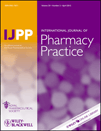Pharmaceutical care in a community-based practice setting in Jordan: where are we now with our attitudes and perceived barriers?
Abstract
Objectives The objective of this study was to answer the following questions. How do community pharmacists in Jordan understand pharmaceutical care? What is the extent of pharmaceutical care practice in community pharmacies in Jordan? What are the main barriers to practising pharmaceutical care in Jordan? What is the attitude of community pharmacies in Jordan when considering provision of pharmaceutical care?
Method A questionnaire was hand delivered to a random sample of 310 community pharmacists. The questionnaire was composed of six different sections including patient demographics, pharmacists' understanding of pharmaceutical care, frequencies of practice of pharmaceutical care, pharmacists' general attitudes about pharmaceutical care, pharmacists' intentions to provide specific pharmaceutical care activities and barriers to providing pharmaceutical care. Frequencies, percentages, means and standard deviations were used to describe pharmacists' responses. Chi-square and regression analysis were also conducted to identify important associations.
Key findings More than 62% of respondents had a correct understanding of the basic concept of pharmaceutical care. The data show that the level of reported pharmaceutical care activities was limited. In general pharmacists have very good attitudes toward pharmaceutical care. Interestingly, more than 90% of respondents fully support the concept of pharmaceutical care. The need for pharmaceutical care training was found to be the top barrier to the provision of pharmaceutical care as indicated by more than 80% of pharmacists.
Conclusions While pharmaceutical care provision is limited at this stage in Jordan, the responding pharmacists had a good understanding of pharmaceutical care. They expressed a willingness to implement pharmaceutical care practice but have identified a number of barriers to successful implementation. With the introduction of PharmD and Master of Clinical Pharmacy programmes, publication of the results of local studies on the benefit of pharmaceutical care, improved communications with physicians and modification of the current undergraduate pharmacy curriculum to include more focus on therapeutics and pharmaceutical care, many of these perceived barriers may be eliminated in the future.




